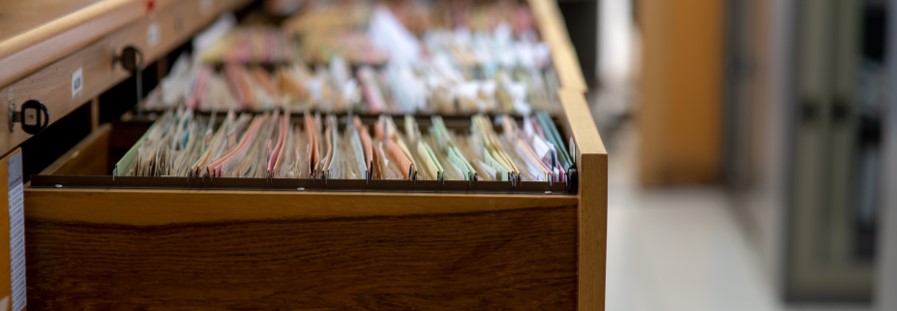Good Record Keeping
A Business Sense Article from PST

When running a business, record keeping is a vital part of your day-to-day operations, whether you are a sole proprietor or a large corporation. In this article, we will discuss general business record keeping practices and specific recommendations for process servers.
What is Record Keeping?
Record keeping is the process of recording transactions and information in an organized and secure way for future reference.
What Types of Documents Should Be Retained for Business Records?
Regardless of the type of business, there are some basic records that all businesses should keep:
- Accounting Records – invoices sent, payments received, bills received, payments made, tax returns, etc.
- Permits and Licenses – your state business license, your professional licenses, etc.
- Insurance Documents – your general liability insurance and your errors & omissions insurance
- Legal Documents – your articles of incorporation, any contracts you have signed, leases, license agreements, etc.
- Personnel and Payroll – timesheets, wages paid each time period, evaluations, etc.
Unique Records Retention for Process Servers
In addition to the basic business documents noted above, here are a few recommendations for types of records to retain as part of your service:
- Field Sheets and Notes Regarding Attempts. It is important to keep a record of attempts and other information regarding the service. If a Motion to Quash is filed you may not remember all the specifics of the serve. Your notes will help to serve as a preserved record of what occurred on each attempt and may help refresh your memory.
- Photographs and GPS Tagging of Attempts. Photographs and GPS tagging are being required by more clients and lenders than ever before, so be sure to save all photographs that document attempts and successful serves. Hopefully, you use a solution that provides automatic GPS tagging of the images.
- Signed Affidavit or Return of Service. Keeping a copy of the signed Affidavit or Return of Service ensures you have a copy of what you provided to your client. This saves time if there is a question regarding service and potential expense if you were to need to obtain a copy from the court.
Why is Record Keeping Important?
We have discussed a few reasons why maintaining process serving records is important, here are a few reasons why it’s important to keep general business records.
- Customer Service. Owning a business will require you to track a significant amount of information, such as clients, cases, and jobs. Without a proper record keeping system, you may lose sight of important business details, leading to problems with serving your clients. If you do not know details about your clients, such as what your clients like, you risk disappointing a client, maybe losing them forever.
- Motion to Quash or Other Challenges. As a professional hired to handle the service, you want to ensure you are assisting your client to defend the service you have completed by maintaining these records.
- Compliance. As a business owner, you will likely execute contracts and be required to hold various licenses and permits. As an employer, you will be required to maintain and report employee payroll for tax purposes. The Small Business Administration (SBA) has provided an excellent resource to assist with what is required and good record keeping practices. Also, as a taxable entity, you will be required to provide an accurate accounting of your income, deductibles, and expenses, and pay the appropriate taxes at the correct time. The Internal Revenue Service (IRS) has provided a website that discusses good record keeping from a financial and tax preparation perspective.
- Planning. Keeping accurate records you monitor your financial performance and review trends and plan budgets and staffing for the next quarter or year.
- Easy Access. Maintaining records in a consistent manner allows you the opportunity to quickly locate information for future use.
When Can I Dispose of Old Records?
- Financial Records. The IRS recommends saving financial records for up to 7 years. Some types of documents are required to be kept longer.
- Other Business Documents and Records. Shredit has a resource guide that outlines how long records are to be maintained.
What Tools Can Help Me?
The SBA reference we provided discusses various methods for helping organize record keeping. You might prefer to store things “old school” in paper folders in a file cabinet. You may consider moving to electronic storage and scanning all pertinent documents for storage on your server or “in the cloud.” In addition to these basic decisions, tools or services that can help you include:
- A Payroll Company – Making use of a payroll company can help take the record keeping with regards to payroll off your shoulders.
- Accounting Software – Even the smallest company should make use of a good accounting package. Quickbooks and Wave are two software packages accessible to even a sole proprietorship.
- Case Management Software – Similar to accounting software, a good case management system is beneficial to even the smallest process serving company. Not only does it help you create professional affidavits for your clients, but it helps manage your cases and jobs, preserving your records in an organized and secure fashion. There will be instances where service can be challenged long after your service has been completed. Some cases have been as many as 7-10 years after service. It is imperative as a serving professional that you preserve information regarding your service to answer questions regarding your service if you are called to testify.
Implementing a good record keeping policy is an essential part of doing business. We encourage you to share your tips and resources regarding this topic.